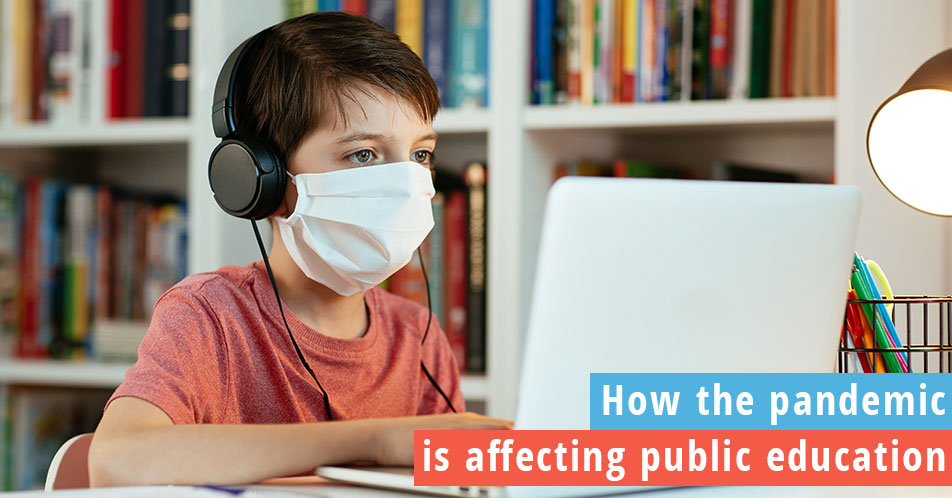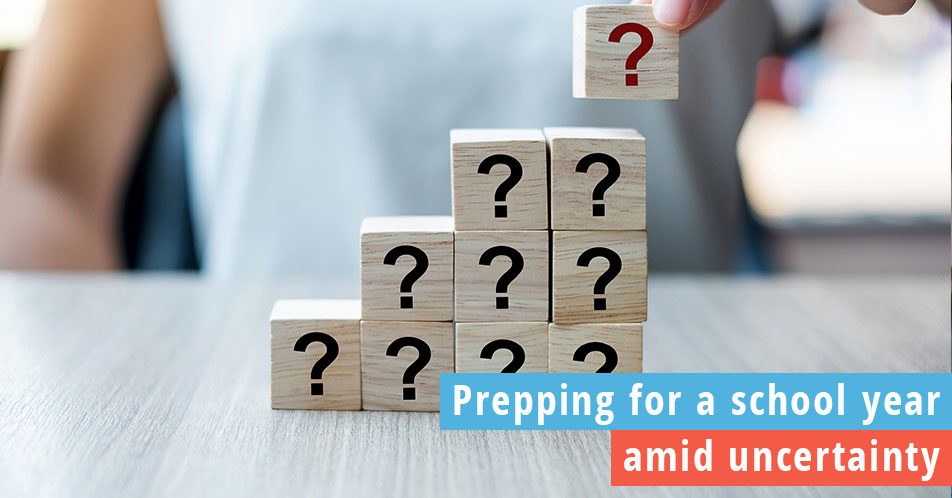Host Joel Gagne discusses how the pandemic is affecting public education with Dr. Jim Lloyd, Superintendent of Olmsted Falls City Schools
In today’s episode of the We Love Schools podcast, host Joel Gagne is joined by Dr. Jim Lloyd, Superintendent of Olmsted Falls City Schools. The two discuss how Olmsted Falls City Schools is handling the COVID-19 crisis and how the pandemic is affecting public education.
Olmsted Falls City Schools’ story is unique because their district is fully remote during the pandemic. The district is working to uphold their standard to inspire and empower the district to maintain their “Triple-A” experience.
Dr. Lloyd starts by giving a bit of a background on OFCS. Olmsted Falls is located in the southwest corner of Cuyahoga County roughly 20 miles outside of downtown Cleveland.
He refers to Olmsted Falls as a bedroom community as they don’t have much industry or commercial property, so the district relies upon the residents to fund the schools.
“We are in the inspire and empower business,” Dr. Lloyd says. “We do that through dedication to providing a Triple-A experience for our kids through academics, arts, and athletics.”
He explains that the district takes all three areas very seriously, and obviously the pandemic is affecting public education in all of those categories. Dr. Lloyd explains that arts and athletics are an important part of building student competencies on what they call “the portrait of an Olmsted graduate.”
The seven competencies are what he says any parent, any business owner, and any CEO would value in a graduate. The seven competencies are as follows:
- Being a good citizen
- Being a creator
- Being a collaborator
- Being a communicator
- Being a critical thinker
- Being self confident
- Being a self director
“We all know that COVID has had a big impact on education,” Joel says. He says he wanted to reach out to Dr. Lloyd specifically because, as he said, OFCS is in the inspire and empower business. Joel asks how as a leader, Dr. Lloyd needed to adjust his school district amid the pandemic.
“You still want to try to stay true to your brand,” Dr. Lloyd says. “But the environment that has been created makes it difficult. The first thing you need to realize is that you’re not in control.”
He explains that as a superintendent, he wants to try to shape and form the variables out there. Obviously, the COVID-19 pandemic is affecting public education in every capacity, and it’s important to accept that schools can no longer work to make the unexpected expected.
“We’re all frustrated, and there’s very little within our control,” Dr. Lloyd says. “We’ve needed to adjust considerably.”
He explains that they understand the importance of in-person learning, and it’s a challenge to inspire and empower students from afar. He explains that they’re learning new ways every day to educate successfully from a distance.
Joel says that school districts, like many other businesses, are creatures of habit. Everything in schools is based on routines, traditionally. That regimen has been taken away from schools, while the expectation for high-quality results is still there.
Joel asks if Dr. Lloyd thinks any of the changes that they’ve made due to COVID-19 will become long-term adjustments for OFCS.
Dr. Lloyd says that some efficiencies in cleaning and other processes are likely to continue beyond the pandemic.
“Even though we’re all probably Zoomed and Google Met out, I believe that you don’t necessarily have to meet face to face in order to be productive,” Dr. Lloyd says. “But at the same time, it’s a very slippery slope if you think that everything can be done through a video chat.”
He also says another idea that they’ve been considering in relation to snow days is that maybe schools can go remote rather than calling the entire day off for a calamity day.
“We used to have this thing called ‘Blizzard Bags’ that would allow us to save time and not have some of our snow days taken away,” Dr. Lloyd explains. He explains that in Ohio once you had more than five snow days, you had to make those days up during the school year. So he said a way for schools in Ohio to get around needing to make up school days in June, they’d have “blizzard bags,” which were essentially packets of educational materials that students could engage in while they were at home. The state of Ohio would be satisfied with that scenario and wouldn’t count it as a day off of school.
He says that now rather than the “blizzard bag,” maybe they’ll be able to meet remotely with students and run some sort of schedule rather than giving students busywork.
Joel says that he’s talked with numerous superintendents who say that the pandemic makes it feel like every day is a snow day.
“At the end of the day, can you look yourself in the mirror and go ‘I believe I made the best decision for students and student learning for my school district in order to stay true to our district’s vision,’” Dr. Lloyd asks.
Joel says that Dr. Lloyd is one of the most engaging superintendents he’s ever seen on Twitter, and he suggests that people in education follow him for inspiration. He asks what he thinks that public school administrators will need as a resource to get them through this pandemic.
“Great bottle of bourbon, Joel,” Dr. Lloyd laughs. “Patience and flexibility are things that public school administrators are going to need to get through this. We’re all engaged in a very large educational experiment.”
They agree that how the pandemic is affecting public education is frustrating for parents, students, educators and stakeholders. Patience and flexibility are keys to get through COVID-19. The conditions and variables are changing so quickly, that administrators will need to be both patient and flexible as plans change from day to day.
If you have questions about your communications plan and your school’s strategy during the pandemic, reach out to the AHC team.
If you have any topics you’d like to hear or have any questions for our team, please reach out via info@weloveschoolspodcast.com.



